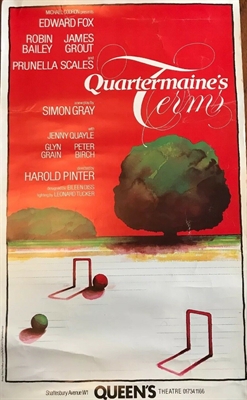Top Qs
Timeline
Chat
Perspective
Quartermaine's Terms
1987 film by Bill Hays From Wikipedia, the free encyclopedia
Remove ads
Quartermaine's Terms is a play by Simon Gray which won The Cheltenham Prize in 1982.[1]
Plot
The play takes place over a period of two years in the 1960s in the staffroom at a Cambridge school for teaching English to foreigners. It deals with the interrelationship between seven teachers at the school, in particular that between St John Quartermaine and the others.
The dominant theme is loneliness, and during the course of the play all of the characters experience the trauma of being or feeling alone. Mark’s wife leaves him; Derek, from Hull, finds Cambridge initially unwelcoming; Eddie is ultimately bereaved by the loss of a partner; Anita’s husband is a philanderer; Henry is trapped in a dysfunctional nuclear family and Melanie is similarly trapped caring for a mother whom she despises. Quartermaine is a painfully lonely bachelor, seemingly with no friends other than his colleagues at the school.
Although the play is at times highly comic, it has a very serious theme; and the struggles of each character with their own types of loneliness are moving and sad. Above all, Quartermaine himself is an increasingly pathetic figure lost in his own confused thoughts – and ultimately deserted. His future as the play closes is poignantly bleak.
Remove ads
Original production
It was first staged on 30 July 1981 at the Queen’s Theatre, London.[2]
- Director: Harold Pinter
- Producer: Michael Codron
- Designer: Eileen Diss
- Lighting: Leonard Tucker
- Critical reception
The Stage wrote, "Simon Gray has written the best play of his notable career, a delicate, moving and yet consistently funny piece, eloquently directed by Harold Pinter, which depicts the English penchant for quiet suffering with immense skill."[3]
Remove ads
Off-Broadway
The play was staged on 24 February 1983 at Playhouse 91 Theater, New York in a production by Long Wharf Theatre.[4]
- Producers: John A. McQuiggan & Ethel Watt
- Director: Kenneth Frankel
- Settings: David Jenkins
- Costumes: Bill Walker
- Lighting: Pat Collins
- Critical reception
The New York Times called it "a play that is at once full of doom and gloom and bristling with wry, even uproarious comedy. The mixture is so artfully balanced that we really don't know where the laughter ends and the tears begin: the playwright is in full possession of that Chekhovian territory where the tragedies and absurdities of life become one and the same."[5]
TV adaptation
A film was broadcast on BBC Two in 1987, as part of the Screen Two series.[6][7]
- Producer: Louis Marks
- Director: Bill Hays
Remove ads
Radio adaptations
- The play was presented on BBC Radio 3 on 26 May 1991.[8]
- Director: Gordon House
- The play was presented on BBC Radio 4 on Saturday 17 June 2006.[9]
- Producer: Catherine Bailey
- Director: Maria Aitken
Remove ads
West End revival
The play opened at Wyndham's Theatre on 23 January 2013, after brief runs at Theatre Royal, Brighton, and the Theatre Royal, Bath.[3]
- Director: Richard Eyre
- Producer: Michael Codron
- Critical reception
The Guardian noted "a rueful social comedy that stands up well to revival and gives star billing to Rowan Atkinson, who reminds us in his first straight play in 25 years that he is a highly capable actor";[10] while The Daily Telegraph wrote "there’s a delight in watching a playwright so in control of his craft that he holds you riveted in a world where only the silence seems to scream."[11]
Remove ads
References
External links
Wikiwand - on
Seamless Wikipedia browsing. On steroids.
Remove ads

